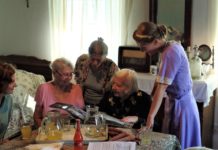Grattan Puxon is a British fighter for Roma rights and a journalist by profession. After refusing conscription into the army from his native England, he fled to Ireland where he met the Irish Travellers and joined their nomadic way of life. He returned to England in 1966 and the same year was one of the founders of the British Romany Council in Kent, where he was the first secretary. Under Puxon’s leadership, the Council launched a campaign of passive resistance against the violent evictions of Roma caravans from public plots, which attracted great media interest. The campaign put pressure to enact the Caravan Sites Act (1968), which obliged municipal councils in England to provide caravan sites for the Roma. Throughout his career, Puxon fought against evictions in Roma settlements, offered support and guidance to those affected by them. In addition, he helped asylum seekers from the Roma community.
Puxon was involved in international movements that contributed to the rights of Roma communities. He participated in organizing the First World Romani Congress in London in 1971. Until then, the political and social position of the Roma had been defined outside the Roma community for centuries, and this event marked a turning point in the history of the Roma struggle for their own identity and social, economic and cultural development. The Congress participants organized their work in five commissions, for education, social issues, war crimes, culture and language, and Puxon contributed by participating in the Commission on War Crimes, which informed those present about the work of a small study group in which, in addition to him, Faik Abdi and Donald Kenrick had been investigating Nazi crimes committed against the Roma people for three years on behalf of the International Romani Committee. At this congress, Puxon was elected General Secretary of the International Romani Union. After the Third World Romani Congress in Germany in 1981, he was succeeded as General Secretary by Rajko Djuric.
Puxon, born in England, lived in Greece, Macedonia, Serbia and the USA. In Greece in the 1970s, he edited the first international magazine in the Romany language Loli Phabai (Red Apple). In addition to numerous pamphlets and articles, he wrote several books on the history and experiences of the Roma people such as On The Road (1967), Rom: Europe’s Gypsies (1973) and the novel Free Born Traveller (2007). In co- authorship with the prominent British Romologist Donald Kenrick, he wrote the first comprehensive study on the genocide against the Roma, The Destiny of Europe’s Gypsies (1972), which has been published several times in as many as eight world languages, including Romany. His entire life was marked by the struggle for the rights of the Roma and Travellers, and he participated in the first meeting of a Roma delegation with members of the Council of Europe Committee, which was only becoming acquainted with the situation of the Roma and Travellers in EU countries. He currently works as an organizer at Ustyben, an organization created to coordinate the political activities of British Roma.











